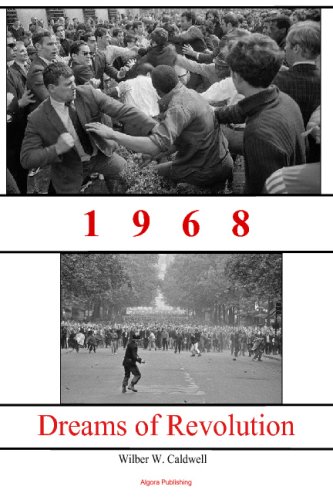Product desciption
1968 Dreams Of Revolution Wilber Pete W Caldwell by Wilber (pete) W. Caldwell 0875866786 instant download after payment.
The 1960s still loom in the national rearview mirror as a kind of cultural myth. Today, most Americans under the age of 60 regard this volatile era with both ignorant wonder and intuitive awe. What was it really like the activism, the violence, the drugs, the counterculture, the permissiveness, the radical politics? Where did it all come from and what were they thinking?This book answers these questions in a neatly interlocking historical narrative of violence, social conscience, and political and cultural rebellion. For the two generations who have grown up since Lyndon Johnson was president, the events as well as the thinking behind the revolutionary and romantic pretensions of the Sixties are almost equally unclear.This was the era of the Beatles, the Rolling Stones and the Summer of Love; it was also at the heart of the civil rights and anti-War movements. The year 1968 saw the assassination of Martin Luther King, Jr., and Robert F. Kennedy, the ascendance of the hippies and Yippies, Black Power, Neo-Marxism, and the beginnings of Postmodernism.When student radicals occupied Columbia University in 1968, they were showing solidarity with student uprisings in Paris and in Frankfurt. This unique novel explores the tensions that were manifest in the student riots in West Germany following the shooting of the student leader Rudi Dutschke, the student revolt at Columbia University, and the tumultuous French May uprising, all of which took place in the spring of 1968. At the heart of the book lie timely concerns regarding the impotence of liberalism within a self-perpetuating system that is fluid enough to contain the forces that would bring about real change. Technically a novel, 1968 walks a fine line between fiction and nonfiction. Owing to its historically faithful storyline, to its biographical portrayals of historical figures, and to its authentic and well-researched intellectual grounding, 1968 follows an entirely documentary agenda. Well-researched historical characters include Tom Hayden, founder of the US Students for a Democratic Society (SDS), Mark Rudd (SDS chairman at Columbia), Red Rudi, Daniel Cohn-Bendit (Danny the Red, now a member of the European Parliament), Ted Gold (of the explosive Weathermen), Karl Wolff of the German SDS, Herbert Marcuse (father of the New Left), Theodor Adorno (father of modern Critical Theory), Hannah Arendt, and the ghosts of Walter Benjamin, Charles Baudelaire, and Karl Marx). They interact with a cast of fictional characters in a real-life story of militant politics, cultural upheaval, and intellectual radicalism.Penetrating questions concerning civil disobedience and cultural hegemony run through the book. Does revolutionary social change spring from a shift in culture, as the hippies saw it? Or does a new culture evolve out of revolutionary action, as posited by Marx and the New Left? What is the proper relationship between theory and practice? Is this the revolutionary moment? Who will lead the revolution now that working people have been seduced into the very fabric of late capitalism?1968 is historical fiction that illuminates a brief flash of revolutionary spirit in the West and brings into focus the evolving counterculture of the late 60s and early 70s about which we all hear so much and understand so little.No other book has attempted to tie so closely the events of the 1960s to emerging radical ideology. No one has attempted to narrate in real-life human terms the fundamental intellectual values of the New Left and of Neo-Marxism, and to relate these theories to events. No other book links this ideology to the actions of historical characters (theorists or revolutionary leaders), or to the motivations of students of the era.


